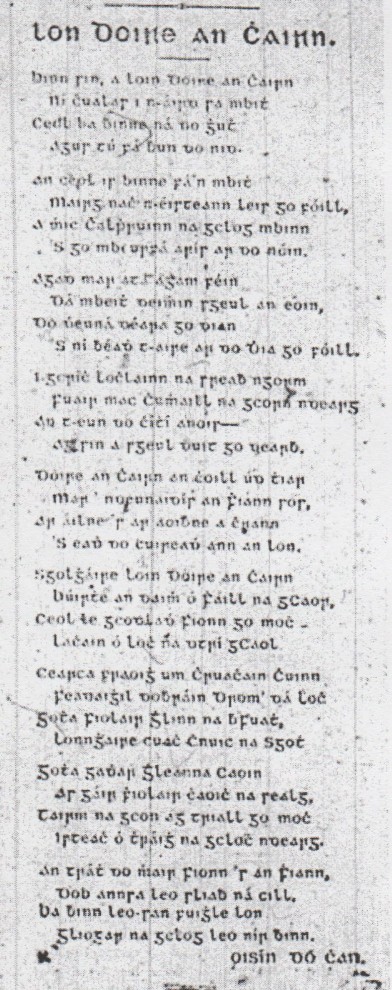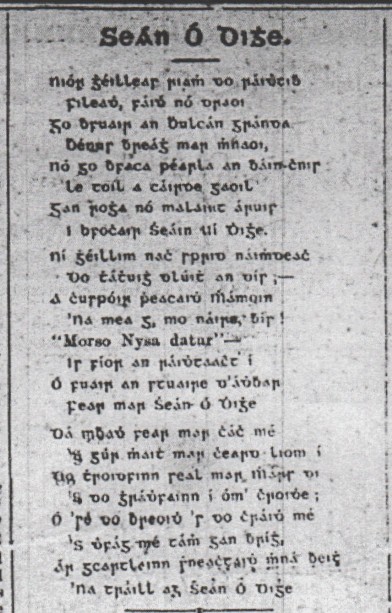Sigerson - Sligo Poets
Main menu:
- Home
-
1912
- 1912
- Sligo Poetry 1912
-
1913
- 1913
- Sligo Poetry 1913
-
1914
- 1914
- Sligo Poetry 1914
-
1915
- 1915
-
Sligo Poetry 1915
- Sligo Newspaper Poems
- Sligo Champion
- Sligo Independent
- Sligo Nationalist
-
1916
- 1916
-
Sligo Poetry 1916
- Sligo Newspaper Poems 1916
- Sligo Champion
- Sligo Nationalist
- Sligo Independent
- The Poets
- Bibliography
- The Author

Sligo Champion
18 March 1916
(Translation by Dr. Sigerson.)
SHAUN O’DEE.
I ne’er believed the story,
Prophetic bard! you sung,
How Vulcan, swarth and hoary,
Won Venus, fair and young,—
Till I saw my pearl of whiteness
By kindred forced to be,
In her robes of snowy brightness,
The bride of Shaun O’Dee!
Nor thought the spirit holy,
A bridal would allow,
Where Mammon spurs them solely
To crown her drooping brow.
"The richest weds the rarest"
That truth, alas, I see,
Since the sunny pearl and fairest
Is the bride of Shaun O’Dee.
Were I like most, ere morrow
A dire revenge I’d take
And in his grief and sorrow
My burning anguish slake.
For gloom o’erclouds my lightness,
O woe’s my heart to see
That form of snowy whiteness
Embraced by Shaun O'Dee.


Sligo Champion
6 May 1016
THE BLACKBIRD OF DARICARN
(Translation by Dr. Sigerson)
Sweet thy song, in Dari grove,
No sweeter song from east to west,
No music like thy voice of love—
And thou beneath thy nest.
A strain, the softest ever heard,
No more shall come its like to men,
O Patrick ! list the wondrous bird—
Thou’lt chant thy hymn again.
If thou, as I, but knew the tale
It sings to all the ancient isle,
Thy tears would rise, and thou wouldst fail
To mind thy God awhile.
In Norroway beyond the wave,
Its forest glades and streams among
That bird was found by Fionn the brave,
And still we hear its song.
’Tis Daricarn yon western wood—
The Fianna huntsmen loved it best,
And there, on stately oak and good,
Lost Fionn placed its nest.
The tuneful tumult of that bird,
The belling deer on ferny steep—
This welcome in the dawn he heard,
These soothed at eve his sleep.
Dear to him the wind-
The whirr of wings, the rustling brake,
Dear the murmuring glens beneath,
And sob of Droma’s lake.
The cry of hounds at early morn,
The pattering o’er the pebbly creek,
The cuckoo’s call, the sounding horn,
The swooping eagle’s shriek.
The mountain, not the cell, they sought,
Great Fionn and the Fianna fleet ;
Than tinkle of the bells, they thought
The blackbird’s song more sweet !
These two Irish (Gaelic language) poems, with their English translations by Dr. George Sigerson (1836–1925), were included in the Sligo Champion under the pen name Brian Mac Morna. Seán Ó Dighe was written by the Cork poet, Piaras Mac Gearailt (1709-
This poem, Seán Ó Dighe, is a lament that the local blacksmith, John O'Dee, has married the handsomest girl in the parish, a girl the poet himself had designs on. In the Sligo Champion, Brian Mac Morna suggests that Seán Ó Dighe represents the English who hope that Ireland, the handsome girl, will accept them. He insists that this will never happen, ending with "Ní thréigfe sí a grádh geal féin!", she (Ireland) will not abandon her own true love.
This poem was obviously published to coincide with St. Patrick's Day and the celebration of the Irish language which occurred around that time. The second poem was published on the same page as the account of the Easter Rising in the Sligo Champion. There is no hint of anti-
Lon Doire an Chairn is a well-
Brian Mac Morna was obviously a pen name. In the Fenian Cycle of Irish mythology Goll mac Morna was a member of the Fianna who had killed Fionn mac Cumhail's father but who allowed Fionn take over the leadership when he proved his worth. Who was using this pen name? There are a few obvious canditates, Irish teachers working in Sligo such as Pádraig Ó Domhnalláin and Seán Ó Ruadháin but it might also be Fr. Brian Crehan, (Brian Ó Críocháin) (1874–1956) who was very prominent in the Sligo Gaelic League at this time.